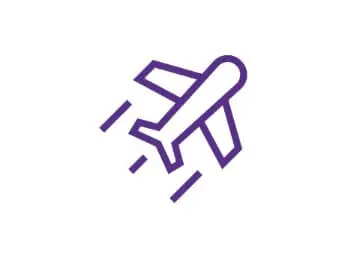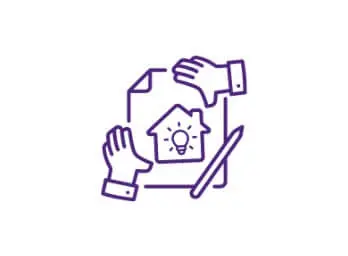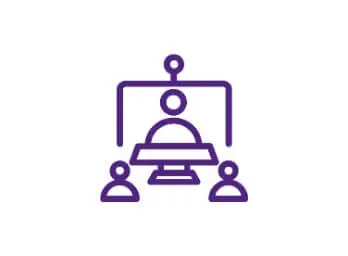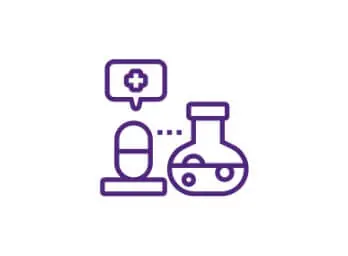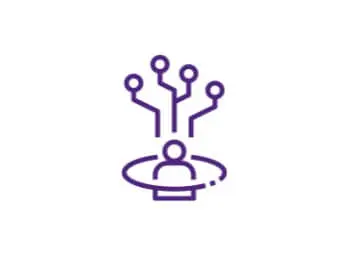Design Thinking: A Toolkit for Breakthrough Innovation
Who Is This Program For?
This program teaches a method of problem solving that will give any professional an advantage in their industry or career. It will be particularly beneficial for:
Product or service managers who seek an innovative, consumer-oriented strategy that minimizes the risk of bringing a new product to market by developing deep insights, rapid prototyping and designing thoughtful experiments
Designers who want to address consumer needs (both stated and unstated) through creative thought processes and advance their careers with a hands-on certificate program
Consultants who want to offer clients differentiated and disruptive solutions by using a step-by-step method of problem solving and integrated design thinking approaches
C-suite professionals, heads of business and entrepreneurs who recognize that gaining an edge and increasing market share require re-imagining their businesses from the bottom up, and wish to make design thinking an inherent philosophy in their organizations
Individuals or teams who are developing transformational business models and searching for new ways to bring offerings to the market with lower risk and strong customer focus
Key Takeaways
This program will equip you to unpack your assumptions about problem solving and will teach you to approach new opportunities with the human experience in mind.
Learn to apply design thinking fundamentals to ensure that a solution is desirable from a human point of view, technologically feasible and economically viable.
Develop an in-depth understanding of the design thinking process from inspiration to implementation, and learn how to transform an idea into an innovative product, service or business model.
Gain hands-on experience with key methods and tools, including the jobs-to-be-done (JTBD) framework, to create and communicate offerings that address customer needs.
Discover how design thinking can nurture your individual creativity, help you overcome resistance to new ideas and provide advantages such as reduced time to market, lower costs and increased market share.
Sessions With Program Leaders
Participate in interactive studio sessions that will give you the opportunity to practice the design process with innovative techniques you can immediately put to use in your personal and professional life. Across three studio sessions, you will have the opportunity to:
Collaborate with peers to experience the full design process while developing a new product or service
Apply design thinking techniques using digital tools and prototype your idea
Explore frameworks and practice giving and receiving constructive feedback
Program Experience
A personalized field guide to reference in future design efforts
Live, Interactive sessions with experienced program leaders and faculty
Insights from leaders in the world of design and innovation
Hands-on activities and projects providing real-world application of techniques
Collaborative opportunities with peers
Industry examples from renowned brands
A dedicated program support team
Innovative frameworks with immediate applications
Knowledge checks
Breakthrough discussions
Program Modules
Over the course of eight weeks, participants will be guided through the foundational principles of design thinking, and explore how professionals in any role can leverage design thinking to achieve innovative outcomes across a wide spectrum of industries.
Pathway to Becoming an Executive Scholar
Participants who successfully complete the Design Thinking: A Toolkit for Breakthrough Innovation program will accrue points toward becoming an esteemed Kellogg Executive Scholar; a unique credential that provides you the opportunity to customize your pathway to achieve your professional development goals.
Kellogg’s expansive program offerings allow you to build a variety of competencies that focus on practical application. More than about learning to lead, the path to becoming an Executive Scholar is about leading through learning.
Testimonials


Program Faculty

Clinical Professor of Strategy, Director of Entrepreneurship Programs at Kellogg, Faculty Director of the Zell Fellows Program, Director of the Levy Institute for Entrepreneurial Practice
David Schonthal is an award-winning professor of strategy, innovation and entrepreneurship at the Kellogg School of Management, where he teaches courses on new venture creatio...
Guest Contributors

Thought Leader and Author

Adjunct Lecturer of Innovation & Entrepreneurship, CEO and founder of the Re-Wired Group

Leader, Global Prosperity research group at the Clayton Christensen Institute
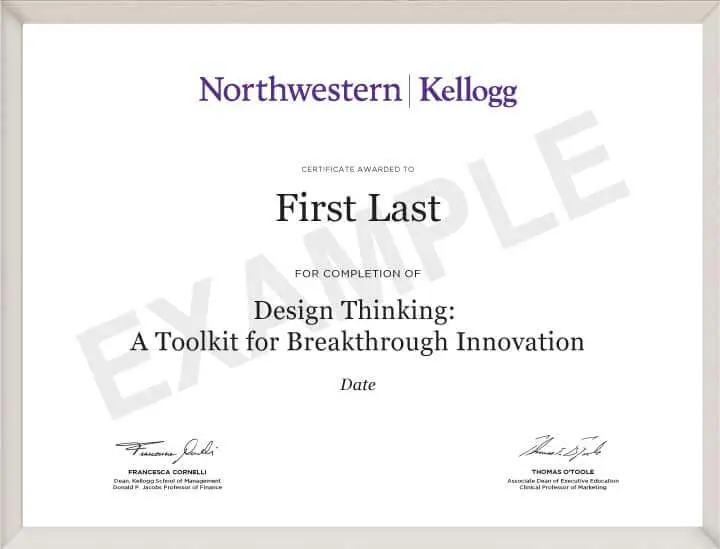
Certificate
Upon successful completion of the program, Kellogg Executive Education grants a verified digital certificate of completion to participants. This program is graded as pass or fail; participants must receive 80% to pass and obtain the certificate of completion.
After successful completion of the program, your verified digital certificate will be emailed to you in the name you used when registering for the program. All certificate images are for illustrative purposes only and may be subject to change at the discretion of Kellogg Executive Education.
Note: This online certificate program does not grant academic credit or a degree from Kellogg School of Management.
FAQs
Financing Options
Climb Credit*
We offer financing options with our partner, Climb Credit*. Click here to learn more.
*Applicable for US Residents
Flexible Payment Options For All
Flexible payment options allow you to pay the program fee in installments. Click here to see payment schedule.
Didn't find what you were looking for? Write to us at learner.success@emeritus.org or Schedule a call with one of our Program Advisors or call us at +1 315 502 3308 (US) / +44 128 291 1923 (UK) / +65 3129 4131 (SG)
Early registrations are encouraged. Seats fill up quickly!
Flexible payment options available.
Last Day To Enroll


